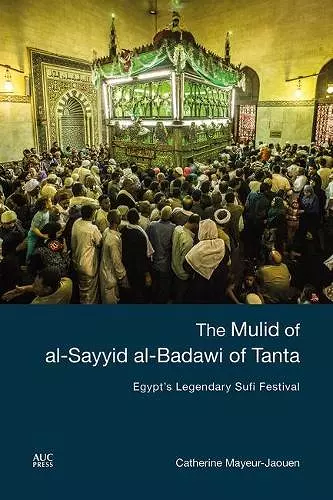The Mulid of al-Sayyid al-Badawi of Tanta
Egypt's Legendary Sufi Festival
Catherine Mayeur-Jaouen author Colin Clement translator
Format:Hardback
Publisher:The American University in Cairo Press
Published:20th Aug '19
Currently unavailable, and unfortunately no date known when it will be back

An indispensable study of a major Egyptian Sufi festival by a foremost expert in the field
Every year, in the heart of the Nile Delta, a festival takes place that was for centuries the biggest in the Muslim world: the mulid of al-Sayyid Ahmad al-Badawi of Tanta. Since the thirteenth century millions of believers from neighboring regions and countries have flooded into Tanta, Egypt’s fourth-largest city, to pay devotional homage to al-Badawi, a much-loved saint who cures the impotent and renders barren women fertile. This book tells for the first time the history of a mulid that for long overshadowed even the pilgrimage to Mecca. Organized by Sufi brotherhoods, it had, by the nineteenth century, grown to become the scene of a boisterous and rowdy festival that excited the curiosity of European travelers. Their accounts of the indecorous dancing and sacred prostitution that enlivened the mulid of al-Sayyid al-Badawi fed straight into Orientalist visions of a sensual and atavistic East. Islamic modernists as well as Western observers were quick to criticize the cult of al-Badawi, reducing it to a muddle of superstitions and even a resurgence of anti-Islamic pagan practices. For many pilgrims, however, al-Badawi came to embody the Egyptian saint par excellence, the true link to the Prophet, his hagiographies and mulid standing for the genuine expression of a shared popular culture. Catherine Mayeur-Jaouen shows that the mulid does not in fact stand in opposition to religious orthodoxy, but rather acts as a mirror to Egyptian Islam, uniting ordinary believers, peasants, ulama, and heads of Sufi brotherhoods in a shared spiritual fervor. The Mulid of al-Sayyid al-Badawi of Tanta leads us on a discovery of this remarkably colorful and festive manifestation of Islam.
"[A]n important contribution to the literature on tasawwuf in Egypt, and it goes without saying that the work is relevant for scholars working in that field. Mayeur-Jaouen is also clearly in conversation with scholars in other disciplines of Islamic Studies and Egyptian history, and I would recommend the book to anyone who needs more convincing that tasawwuf has existed within the scope of orthodoxy in Egypt. Additionally, because of its large scope, approachable language, and clear style, it is a book that can easily be taught in a college classroom."—Ida Sofie Nitter, International Journal of Middle East Studies
ISBN: 9789774168925
Dimensions: unknown
Weight: 518g
264 pages